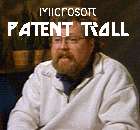

APPALLING. That's what Microsoft appears to have given the world. First it put a tax on every computer sold, removing people's ability to avoid this tax even if they want nothing to do with Microsoft. Now they want to force people to pay Microsoft a tax no matter which phone they buy. That's right, and if it's not Microsoft pulling those strings, then it's the two co-founders of the company and their former CTO, who with funding from a Microsoft co-founder created the world's largest patent troll, Intellectual Ventures. Watch how patent lawyer types try to white-wash the patent trolls' role in industry and cover the fact that Gates and his buddy Myhrvold are extorting RIM for its phones, just like HTC and Samsung (for Linux), allegedly after Myhrvold did his blackmail routines. Here is how patent lawyers put it (subscription required):
RIM signs up with IV as RPX hits 80 http://is.gd/c7j7YP
Turns out, that patent exists — and the company that owns it is looking to sue juuuust about everyone.
The patent in question was granted back in 2009, to a company called HW Technology. Now they’re taking on Apple and their App Store, Google and their Android Market, and RIM and their BlackBerry App World. Oh, and HTC, LG, and Nokia. Oh! And Amazon, eBay, Hotels.com, Buy.com, and Priceline, and 21 other entities.
The lawsuit, filed earlier this week, primarily targets anything that “allows users to complete a merchant transaction without the need to generate a voice call.”
More than two decades ago, soon after starting out in the mobile phone business, Nokia found itself on the receiving end of a massive patent infringement lawsuit from the company that had pioneered cellular communications: Motorola.
The Finnish group was in a vulnerable position. As a newcomer, it lacked enough patents of its own to counter-sue Motorola and fight it to a standstill.
Update: The issue about Xoom WMA support isn't directly related to Google and Android itself --- it's instead an issue with Motorola. As a commenter on this blog below notes, WMA and WMV support wasn't baked directly into earlier Android versions. Instead, apparently Motorola added that support in its Droid, Droid 2, and Droid X. The company dropped it from Xoom.
"That's what happens when Microsoft decides to act like a patent troll..."The mobile space is becoming a sordid mess when it comes to patents and someone who pays close attention has noticed "Internet protocol (IP) phone with search and advertising capability", which is yet another outrageous patent (joining the likes of "over the Internet" patents, this time being "on a phone" patent)
Michael Larabel, the revered editor of Phoronix whom I considered to be my online friend for years, is also recognising that software patents are becoming a huge problem for Linux. In his new and unusual post, "What Would Be Disastrous For Linux, Open-Source", he writes:
Here's a few that I thought of this morning. Feel free to share your Linux doomsday scenarios in the forums.
Patent trolls increasing their assertions against Linux and key open-source software. If the Linux market-share continues to rise, the frequency of patent attacks or free software projects being impaired by software patents will only continue to rise. Enough said.
[...]
Patent assertions against Mesa. Any direct legal attacks against the core Mesa (or Gallium3D) library would endager the Linux desktop. This would likely be the greatest threat to Linux user-space or in general short of claims against the Linux kernel. When it comes to graphics IP, this is a hot area and has already held up a number of features like S3TC support from being implemented in the mainline tree and other features that are protected by patents that will not expire for many years. This is preventing even core parts of the OpenGL 3.x specification from being implemented.
What makes this particularly dangerous is that there is no other open alternative for providing OpenGL support and hardware acceleration, short of starting over from scratch (or somehow salvaging ancient Utah-GLX code). Mesa is found installed on virtually every Linux desktop, whether it is used or not. If a project like GNOME or Compiz faced serious legal challenges, there's still at least alternatives out there, but not for Mesa aside from installing proprietary AMD and NVIDIA drivers. Intel support though would then be killed off along with other obscure drivers. Even if GCC was attacked, there's LLVM/Clang, Open64, and numerous other compilers out there, but when it comes to the user-space graphics, there's really only Mesa.
[...]
The US government begins taxing open-source software. It's actually not as crazy as it sounds and could actually happen.